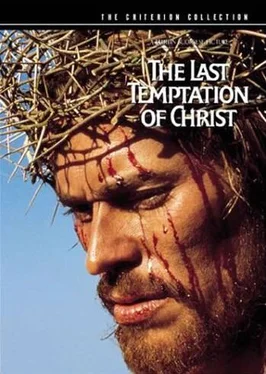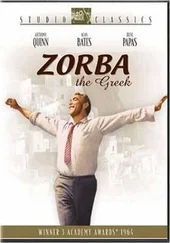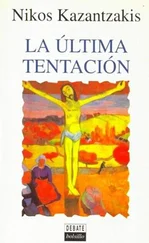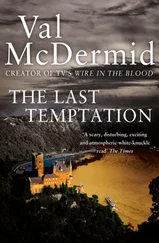Nikos Kazantzakis - The Last Temptation of Christ
Здесь есть возможность читать онлайн «Nikos Kazantzakis - The Last Temptation of Christ» весь текст электронной книги совершенно бесплатно (целиком полную версию без сокращений). В некоторых случаях можно слушать аудио, скачать через торрент в формате fb2 и присутствует краткое содержание. Жанр: Современная проза, на английском языке. Описание произведения, (предисловие) а так же отзывы посетителей доступны на портале библиотеки ЛибКат.
- Название:The Last Temptation of Christ
- Автор:
- Жанр:
- Год:неизвестен
- ISBN:нет данных
- Рейтинг книги:5 / 5. Голосов: 1
-
Избранное:Добавить в избранное
- Отзывы:
-
Ваша оценка:
- 100
- 1
- 2
- 3
- 4
- 5
The Last Temptation of Christ: краткое содержание, описание и аннотация
Предлагаем к чтению аннотацию, описание, краткое содержание или предисловие (зависит от того, что написал сам автор книги «The Last Temptation of Christ»). Если вы не нашли необходимую информацию о книге — напишите в комментариях, мы постараемся отыскать её.
The Last Temptation of Christ — читать онлайн бесплатно полную книгу (весь текст) целиком
Ниже представлен текст книги, разбитый по страницам. Система сохранения места последней прочитанной страницы, позволяет с удобством читать онлайн бесплатно книгу «The Last Temptation of Christ», без необходимости каждый раз заново искать на чём Вы остановились. Поставьте закладку, и сможете в любой момент перейти на страницу, на которой закончили чтение.
Интервал:
Закладка:
“Let me help you,” he said. “You’re tired.”
The son of Mary turned and gazed at the fisherman but did not recognize him. This entire journey seemed to him a dream. His shoulders had suddenly been unburdened and now he was flying in the air, just as one flies in one’s dreams. It couldn’t have been a cross, he thought; it must have been a pair of wings! Sponging the sweat and blood from his face, he followed behind Peter with sure steps.
The air was a fire which licked the stones. The sheep dogs which the gypsies had brought to lap up the blood stretched their well-fed bodies out at the foot of a rock, by the edge of the pit their masters had dug. They were panting, and sweat poured from their dangling tongues. You could hear the drumming of the people’s heads in this blast furnace, the bubbling of their brains. In such heat all frontiers shifted-good sense and foolishness, cross and wings, God and man: all were transposed.
Several tenderhearted women revived Mary. She opened her eyes and saw her barefooted, emaciated son. He was at last about to reach the summit, and in front of him was another man carrying the cross. Sighing, she turned around as though seeking help. When she saw her fellow villagers and the fishermen she started to go near in order to lean against them-but too late! The trumpet blared at the barracks, more cavalrymen emerged, clouds of dust flew up, the people crowded together again, and before Mary had time to step up onto a rock in order to see, the cavalrymen were on top of them, with their bronze helmets, their red cloaks, and the proud, well-nourished horses which trampled the Jewry under foot.
The rebel Zealot came forward, his arms tied in back of him at the elbows, his clothes torn and bloody, his long hair pasted to his shoulders by blood and sweat, his gray thorny beard immense, his motionless eyes staring directly in front of him.
The people were terrified at the sight. Was this a man, or hidden deep within his rags was there an angel or a devil whose compressed lips guarded a terrible and unconfessable secret? The old rabbi and the people had agreed that in order to give the Zealot courage, as soon as he appeared they would join all together in singing at the top of their voices the psalm of war: “Let my enemies be scattered.” But now the words stuck in their throats. Everyone felt that this man had no need of courage. He was above courage: unconquerable, insuppressible-and freedom was enclosed in those hands fettered behind his back. They all looked at him in terror and remained silent.
Riding in front of the rebel and pulling him along with a cord attached to the rear of his saddle was the centurion, his skin baked hard by the oriental sun. He had long ago begun to detest the Jews. For ten years he had put up crosses and crucified them, for ten years he had stuffed their mouths with stones and dirt to silence them-but in vain! As soon as one was crucified a thousand more lined up and anxiously awaited their turn, chanting the brazen psalms of one of their ancient kings. They had no fear of death. They had their own bloodthirsty God who lapped up the blood of the first-born male children, they had their own law, a man-eating beast with ten horns. Where could he catch hold of them? How could he subjugate them? They had no fear of death, and whoever has no fear of death-the centurion had often meditated on this here in the East-whoever has no fear of death is immortal.
He drew back on the reins, stopped his horse and swept his eyes over the Jewry: eroded faces, inflamed eyes, soiled beards, greasy mops of hair. He spat with disgust. If he could only leave, leave! If he could only return once more to Rome with its many baths, its theaters, amphitheaters and well-washed women! He detested the East-its smells, its filth, its Jews!
The gypsies were shaking their sweat onto the stones. They had set the cross into its hole at the top of the hill. The son of Mary sat on a rock and looked at them, looked at the cross, the people, at the centurion who dismounted in front of the crowd; looked and looked, but saw nothing except an ocean of skulls beneath a fiery sky. Peter approached and leaned over to speak to him. He spoke, but a stormy white-capped sea was beating against the youth’s ears, and he did not hear.
At a nod from the centurion the Zealot was released. He drew tranquilly to one side in order to recover from his numbness, and then began to undress. Magdalene slid between the legs of the horses and started to approach him, her arms spread wide, but he repulsed her with a wave of his hand. An old woman with a stiff, aristocratic air pushed her way through the crowd without a word and took him in her arms. He lowered his head, kissed both her hands for a long time, clasped her tightly to his breast and then turned away his face. Mute and dry-eyed, the old woman remained where she was a few moments longer and looked at him.
“You have my blessing,” she murmured finally, and she went and leaned against the rock opposite, together with the gypsy sheep dogs that were stretched out in the scanty shade, panting.
Stamping his foot on the ground, the centurion leaped back into the saddle so that everyone could see and hear him. Brandishing his whip over the multitude to command silence, he spoke. “Listen to my words, Hebrews. Rome speaks. Quiet!”
He pointed with his thumb to the Zealot, who had already removed his rags and was standing under the sun, waiting.
“This man who now stands naked before the Roman Empire lifted his hand against Rome. While still a youth he pulled down the imperial eagles; then he took to the mountains and besought all of you to join him there and to raise the banner, telling you that the day had come when the Messiah would issue from your bowels and destroy Rome!… Quiet out there, stop your shouting!… Rebellion, murder, betrayal: those are his crimes. And now listen, Hebrews, listen to what I ask-I want you to be the ones to pass sentence. What punishment does he deserve?”
He swept his eyes over the crowd below him and waited. The people were in an uproar. They bellowed, pushed one another, left the area assigned to them and rushed up to the centurion, right to the feet of his horse, but then immediately recoiled in terror and flowed back in the opposite direction, like a wave.
The centurion grew furious. Spurring his horse, he advanced toward the multitude.
“I ask you,” he roared, “what punishment for the rebel, the murderer, the traitor-what punishment?”
The redbeard bolted forward in a frenzy, no longer able to control his heart. He wanted to shout “Long live freedom!” and had already parted his lips, but his companion Barabbas seized him and placed his hand over his mouth.
For a long moment there was no sound except a rumble like that of the sea. No one dared speak, but everyone groaned quietly, sighing and gasping for breath. Suddenly a shrill voice was heard above this unsettled din. Everyone turned, both out of joy and fear. The old rabbi had climbed once more onto the redbeard’s shoulders. Lifting both his skeleton-like hands as though he wished to pray or bring down a curse, he boldly cried, “What punishment? The royal crown!”
Feeling sorry for him, the people bellowed in an effort to drown out his voice. The centurion did not hear.
“What did you say, Rabbi?” he called, cupping his hand over his ear and spurring his horse.
“The royal crown!” the rabbi repeated with all his might. His face gleamed, his whole body was on fire; he shook, jumped, danced upon the blacksmith’s shoulders: it seemed he wanted to take to the air and fly.
“The royal crown!” he shouted again, delighted that he had become the mouth of his people and of his God, and he stretched forth his arms to either side as though he were being crucified in the air.
Читать дальшеИнтервал:
Закладка:
Похожие книги на «The Last Temptation of Christ»
Представляем Вашему вниманию похожие книги на «The Last Temptation of Christ» списком для выбора. Мы отобрали схожую по названию и смыслу литературу в надежде предоставить читателям больше вариантов отыскать новые, интересные, ещё непрочитанные произведения.
Обсуждение, отзывы о книге «The Last Temptation of Christ» и просто собственные мнения читателей. Оставьте ваши комментарии, напишите, что Вы думаете о произведении, его смысле или главных героях. Укажите что конкретно понравилось, а что нет, и почему Вы так считаете.












